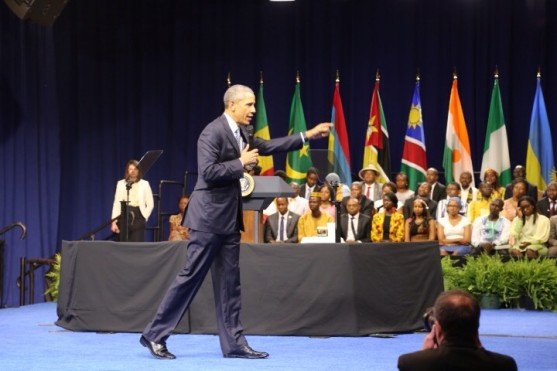
The Mandela Washington Fellowship for Young African Leaders brings 500 dynamic young African leaders, ages 25-35, from across the continent to twenty U.S. universities and colleges for six weeks of leadership training and mentoring in business and entrepreneurship, civic engagement, and public administration. I had the opportunity to meet some of this year’s Mandela Washington Fellows at the Presidential Summit of the Young African Leaders Initiative (YALI) August 2-5, 2015 in Washington, DC. An 80-minute session with President Obama was a highlight of the event. The president welcomed the fellows, stating that our greatest challenges—inclusive development, fighting terrorism, dealing with conflict and climate change, and increasing women’s and children’s rights—are bigger than any one nation or one continent can confront.
The president said the hope is that in ten to twenty years, when YALI Fellows go on to be government and business leaders and pioneers of social change, they will still be connecting and learning from each other and helping the next generation of global leaders work together across borders. During a dynamic Q&A session with the president, one of the exchanges most relevant to the Corporation’s African Higher Education and Research (HERA) program involved 27-year-old Nigerian, Olusola Owonikoko. He asked President Obama how building African capacity and universities fit into the US administration’s investments like Power Africa and what the US was willing to do about brain drain—the brightest minds of Africa flocking to the West in detriment to their respective countries.

Calling it an excellent question, President Obama agreed that building African capacity was a major component of investments like Power Africa. He then asked what African countries are doing to reverse brain drain. “The issue is not just that we’re a wealthier country,” the president said. “I think it’s fair to say — and you know better than I do — but part of it has to do with a young person’s assessment of ‘can I succeed in applying my talents if, for example, the economy is still built on corruption so that I have to pay a bribe or be well-connected in order to start my business?
“’Or are there still ethnic rivalries in the country, which means that if I’m from the wrong tribe, I’m less likely to advance? Or is there still so much sexism in the country that if I’m a woman, then I’m expected just to be at home and be quiet, when I’m a trained doctor? Or is there a lack of rule of law or basic human rights and freedoms that make me feel as if I am restricted in what I can do?’”
Building capacity of the next generation of academics and providing opportunities for the academic diaspora to contribute to the development of Africa’s future are aims of Carnegie Corporation’s HERA program through its investment in postgraduate education and diaspora linkages.
About Olusola Owonikoko
On a visit to Carnegie Corporation offices Owonikoko explained that he had prepared his question for the president in advance, having learned from his professor and mentor, Dr. Olusoji Igunnugbemi, to always be prepared. It paid off again later that same day, when Owonikoko was called to the White House to meet with Ambassador Susan Rice, who asked for his advice about issues in Africa as well as recommendations for the YALI program.
Originally from a rural village, Owonikoko graduated from the University of Ilorin in Nigeria and earned an online EdX Certificate in public health from Harvard. He also wants to pursue a Master’s in international development at a university in the U.S. During his stay here, Owonikoko is working on a five-day internship in New York City with LifeStyles for the Disabled, an organization that provides realistic work settings and experiences for intellectually disabled people. He learned about Lifestyle on his YALI stay at Wagner College in Staten Island. Owonikoko plans to set up a Memo of Understanding (MOU) for a partnership between LifeStyle and his organization, Project Enable, which trains and advocates for Nigeria’s disabled community.


